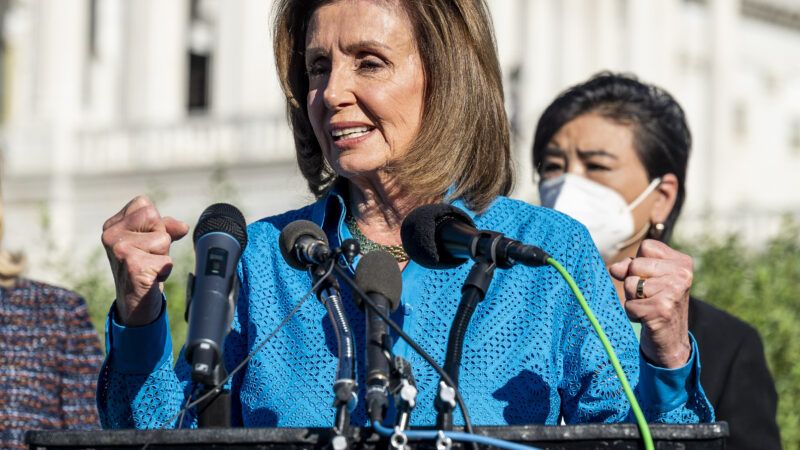House Votes To Make Your Daughters Eligible for the Military Draft
With minimal debate, Selective Service was doubled in a "must-pass" $778 billion defense bill.

Thursday night, because Washington is no longer serious about rudimentary governance, the House of Representatives took what will likely be the decisive legislative step of expanding mandatory age-18 Selective Service registration to include women.
The House voted 316–113 on the "must-pass" annual National Defense Authorization Act (NDAA), which at $778 billion this year gave President Joe Biden $24 billion more than he asked for. The up-or-down passage came after consideration of a series of amendments, from requiring congressional approval for troop deployment in Syria (which failed, 141–286), to allowing cannabis-related companies in legal-marijuana states to obtain banking services (which passed by voice vote).
Amazingly if not quite surprisingly, the effective doubling of the federal government's claim on the lives of American 18-year-olds was never submitted to a standalone vote on the House floor, because Democratic leadership refused to allow it. The Senate's version of the NDAA, which is expected to be voted on next month, already includes mandatory draft registration for women. So unless that changes in the amendment process, potential lady-conscription will be sitting on the desk of a willing Biden this fall.
"Under no circumstances will I support a NDAA that requires my daughter—and thousands of other young women—to register for the draft," Rep. Chip Roy (R–Texas), a member of the draft expansion–opposing House Freedom Caucus, said in a statement after Thursday's vote.
But Roy was outnumbered in his own party. "The NDAA is never perfect, and this is the case where the good far outweighs the bad," Rep. Jim Banks (R–Ind.), chairman of the Republican Study Committee, told the Washington Examiner, in a concise encapsulation of how "must-pass" bills enable questionable lawmaking.
The Selective Service System was first founded in 1917 to feed bodies into America's World War I efforts. It was disbanded in 1920, fired back up in 1940, re-formatted in 1948, and then terminated in 1975 as part of Washington's decisive shift to an all-volunteer military. Then a panicky President Jimmy Carter in 1980, alarmed by the Soviet Union's invasion of Afghanistan, reinstituted draft registration as a just-in-case rite of passage for boys to complete within 30 days of their 18th birthday, under theoretical penalty of five years imprisonment and (eventually) up to $250,000 in fines.
While there have only been 14 convictions for Selective Service refuseniks, and none since 1986, those 100,000 or so young men per year who disobey Washington's marching orders are typically barred from working government jobs, receiving student loans, and (in around 40 states) obtaining a driver's license.
The move to double the federal government's imposed burden on 18-year-olds accelerated in 2016 as women finally became eligible for all combat positions in the U.S. military. Exposing young women to the same penalties as young men has been seen by many, including the American Civil Liberties Union, as a fundamental question of fairness and equity.
"By reforming the Selective Service to be gender-neutral based registration, we draw on the talents of our entire nation in the time of a national emergency," Rep. Chrissy Houlahan (D–Pa.), a former Air Force officer, said in a statement September 1 after the House Armed Services Committee approved the measure by a 35–24 vote. "The current male-only registration sends a message to women not only that they are not vital to the defense of the country, but also that they are not expected to participate in defending it."
That is one way of looking at it. Another is that the best way to equalize a government burden across populations is to remove the burden altogether. Particularly when it involves something so antithetical to human freedom as having the state laying potential claim to the very lives of its citizens.
It's jarring but instructive to see the language of inclusion meld with the language of militarism. "If it's so grave that we have to go to a draft, we need everybody," Rep. Michael Waltz (R–Fla.), a Green Beret veteran, said in a statement after the September 1 committee vote. "We need man, woman, gay, straight, any religion, Black, white, brown. We need everybody, all hands on deck." Like a Benetton ad, only with guns.
The equity framing also makes it easier to portray and dismiss opponents of drafting women as retrograde loons. "Conservatives have howled about 'drafting our daughters,' but other lawmakers in both parties argue there's no reason to exempt women from registering now since combat jobs were opened to them in 2016," reported The Hill in a straight news piece. "Conservatives are riled up," echoed Roll Call.
"Some staunch conservatives," The Hill asserted in a different piece, "have sought to pull the issue into their broader culture wars."
The more frequent journalistic play, though, has been to present the issue as an obviously logical next step. "Considered controversial just five years ago," The Washington Post wrote, in its lone paragraph Thursday on the change, "the idea has gained bipartisan support as combat roles previously closed to women have opened."
Lack of political controversy translates into lack of media interest, just as lack of individual laws or amendments translates into lack of legislative debate about issues of fundamental importance.
Would an up-or-down, full-chamber vote on expanding the Selective Service to include women lead to the same outcome as cramming the provision into a must-pass defense spendapalooza? Maybe, maybe not (public opinion has tilted slightly in favor). But without allowing for that discovery process, Washington has yet again furthered both the perception and the reality that decision making at the Leviathan level is immune to democratic accountability.
Girls yesterday were placed on a collision course with a system that could impact their education, licensure, livelihood, and potentially even lives. Yet you probably heard less about that than you did about the tears of Rep. Alexandria Ocasio-Cortez (D–N.Y.). America's political culture is sick.


Show Comments (128)